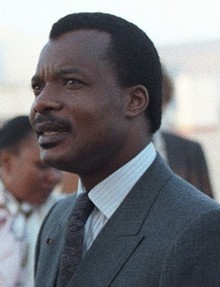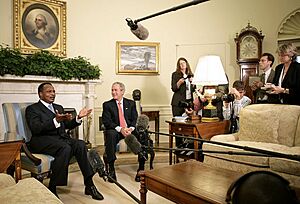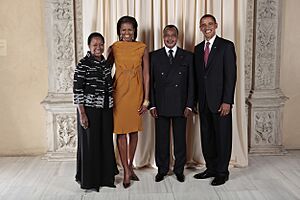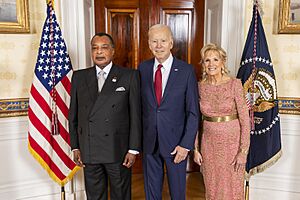Denis Sassou Nguesso facts for kids
Quick facts for kids
Denis Sassou Nguesso
|
|
|---|---|
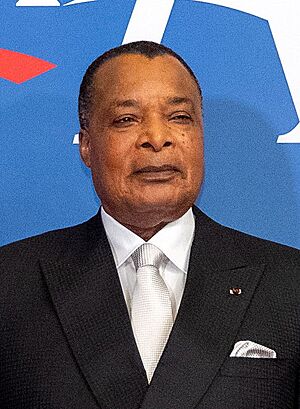
Sassou Nguesso in 2024
|
|
| 5th and 7th President of the Republic of the Congo |
|
| Assumed office 25 October 1997 |
|
| Prime Minister | Isidore Mvouba Clément Mouamba Anatole Collinet Makosso |
| Preceded by | Pascal Lissouba |
| In office 8 February 1979 – 31 August 1992 |
|
| Prime Minister | Louis Sylvain Goma Ange Édouard Poungui Alphonse Poaty-Souchlaty Pierre Moussa Louis Sylvain Goma André Milongo |
| Preceded by | Jean-Pierre Thystère Tchicaya (acting) |
| Succeeded by | Pascal Lissouba |
| Personal details | |
| Born | 23 November 1943 Edou, then part of French Equatorial Africa |
| Political party | Congolese Party of Labour (1969–present) |
| Spouse |
Antoinette Loemba Tchibota
(m. 1969) |
| Relations | Aimé Emmanuel Yoka (uncle) Pierre Anga (uncle) |
| Children | Denis-Christel Sassou Nguesso Edith Lucie Bongo |
| Military service | |
| Allegiance | |
| Branch | Armed Forces of the Congo |
| Rank | General |
Denis Sassou Nguesso (born 23 November 1943) is a politician and former military officer from the Republic of the Congo. He has been the president of the Republic of the Congo since 1997. He also served as president earlier, from 1979 to 1992.
During his first time as president, Sassou Nguesso led the Congolese Party of Labour (PCT) for 12 years. In 1989, his daughter, Edith Lucie Bongo, married Gabonese President Omar Bongo. In 1990, Sassou Nguesso allowed many political parties to form. However, a big meeting in 1991 took away most of his presidential powers, making him a leader with mostly ceremonial duties. He ran in the 1992 presidential election but came in third place.
Sassou Nguesso was an opposition leader for five years. He returned to power during the Second Republic of the Congo Civil War. His forces removed President Pascal Lissouba from power. After a time of change, he won the 2002 presidential election. Not many opposition groups took part in this election. He was re-elected in the 2009 presidential election. In that same year, his daughter and her husband, Omar Bongo, passed away.
In 2015, Sassou Nguesso introduced a new constitution through a public vote. This happened even though opposition leaders asked people to boycott the vote and then rejected the results. The new constitution allowed him to run for president again. Sassou Nguesso was re-elected in the 2016 and 2021 presidential elections. He won with a majority of votes in the first round each time.
Contents
Early Life and Education
Denis Sassou Nguesso was born on 23 November 1943, in Edou, a town in northern Congo. He is a member of the Mbochi ethnic group. His parents were Julien Nguesso and Émilienne Mouebara. Denis was the youngest child in his family. His father was a well-known hunter chief in Edou.
He went to primary school in Fort Rousset, which is now called Owando. From 1956 to 1960, he studied at Dolisie Normal College.
Military Career
Sassou Nguesso joined the army in 1960, just before Congo became an independent country. He received military training in Algeria. In 1962, he returned to Congo and became a second lieutenant. A year later, he went to a special school for infantry in France and graduated as a lieutenant.
He then joined Congo's special paratroop regiment. He was one of the first officers in the Airborne Group, which was the first paratroop battalion of the Congolese Army. This group was started by Marien Ngouabi in 1965. Sassou Nguesso led the Airborne Group, the army, and the Brazzaville Military Zone. He also headed the Intelligence department for State Security. He rose through the ranks, becoming a captain, then a commander, a colonel in 1978, and finally an army general in 1989.
Political Journey
Early Political Steps (1963–1979)
In 1968, Sassou Nguesso was part of a military takeover that removed President Massemba Debat from power. This brought Marien Ngouabi to lead the country. Sassou Nguesso helped create the National Revolution Council in December 1968. This group limited the president's powers. Ngouabi officially became the head of state in January 1969.
In December 1969, Sassou Nguesso was chosen to be a member of the first central committee of the new Congolese Party of Labour (PCT). This was a communist party. Marien Ngouabi was the president of this party's central committee and also the head of state. A new constitution was put in place on 31 December 1969, naming the country the People's Republic of Congo.
In March 1970, Sassou Nguesso joined the political office of the PCT. This happened after a failed attempt to overthrow the government. In May 1973, he became the Director of State Security.
In 1975, during an economic crisis, Sassou Nguesso was part of a small group of five leaders who took charge. This group was led by Marien Ngouabi. They suggested making big changes to the country's revolution. Around this time, at age 32, he was also made Minister of Defense and Security.
On 18 March 1977, President Marien Ngouabi was killed. A military committee, led by Major Sassou Nguesso, quickly took power. They canceled the 1973 constitution. Sassou Nguesso was the temporary head of state for a short time. Then, he gave the position to General Joachim Yhombi-Opango, who became president. Sassou Nguesso became the first vice president of the committee and kept his role as minister of defense.
Soon after Ngouabi's death, former president Massamba-Debat and former prime minister Pascal Lissouba were arrested. They were accused of being involved in the killing. Massamba-Debat was executed on 25 March 1977. Sassou Nguesso was appointed temporary president on 8 February 1979. He was then confirmed as the head of the central committee, President of the Republic, and head of state for five years.
In July 1979, elections were held. The Congolese Labor Party won all the seats in the People's National Assembly. A new constitution was approved by a public vote, confirming the country's socialist ideas.
First Presidential Terms (1979–1991)
As the new president, Sassou Nguesso worked to get loans from the International Monetary Fund. He also allowed foreign companies from France and the Americas to extract oil and minerals.
Even though some saw him as leaning towards the Soviet Union and Cuba, Sassou Nguesso built strong ties with France. He relied on France to help Congo's economy. A French oil company, Elf Aquitaine, was very important in developing Congo's oil fields. This helped double oil production and supported the government's finances.
He visited France in 1979 and 1981 to ask for economic help. In 1980, important French leaders visited Brazzaville to celebrate its 100th anniversary.
In May 1980, Sassou Nguesso signed a 20-year friendship agreement with the Soviet Union. He also sent delegations to China. However, France provided most of Congo's foreign aid, while the Soviet Union's help was much smaller.
Sassou Nguesso was re-elected for a five-year term as President in July 1984. He announced that Yhombi-Opango would be released. He also served as Chairman of the Organization of African Unity from 1986 to 1987. In late 1987, he faced a serious military uprising in the north of the country, which he managed with help from France.
In July 1989, Sassou Nguesso was re-elected as President again. The PCT party won all the seats in the People's National Assembly. In 1990, he allowed many political parties to form. However, a big meeting in 1991 took away most of his presidential powers. He remained as a ceremonial head of state. He ran in the 1992 presidential election but came in third.
In February 1991, a national conference began. The opposition groups gained control of this meeting. Sassou Nguesso did not challenge their decisions. He faced strong criticism and accusations during the conference. Some even claimed he was involved in Ngouabi's death.
Years in Opposition (1992–1997)
In the parliamentary election of June–July 1992, Sassou Nguesso's party won only 19 out of 125 seats. The party led by Pascal Lissouba became the largest.
In the August 1992 presidential election, Sassou Nguesso was eliminated in the first round, getting 17% of the votes. He did not do well in most areas, except for the north. The second round was between Lissouba and Bernard Kolelas. Sassou Nguesso supported Lissouba, who won the election.
Lissouba became President on 31 August. A new government was formed. However, a new group of parties, including Sassou Nguesso's PCT, formed an alliance. This new group had a majority in parliament. In October, the National Assembly voted against the prime minister, who then resigned. In November, President Lissouba dissolved Parliament and called for new elections.
A civil conflict began in November 1993. This happened because opposition parties, including Sassou Nguesso's, disagreed with the results of the parliamentary elections. Armed groups supporting President Lissouba fought against groups supporting Kolelas and Sassou Nguesso. The conflict ended in December 1995. It resulted in many deaths and displaced people.
After this, Sassou Nguesso spent seven months in Paris in 1996. He returned on 26 January 1997 to run in the upcoming presidential election.
Return to Presidency (1997–2008)
Another civil conflict started a few weeks before the presidential election. In May 1997, a visit by Sassou Nguesso to Owando led to violence between his supporters and those of Yhombi-Opango. On 5 June 1997, government forces surrounded Sassou Nguesso's home. They were trying to arrest people involved in the violence. Fighting broke out, leading to the second civil war.
At first, Kolelas's group stayed neutral. But in September 1997, he joined the president's side and became prime minister. Later that month, troops and air forces from Angola joined the fight, helping Sassou Nguesso a lot. By October, Sassou Nguesso was in control. Lissouba, Kolelas, and Opango left the country. On 25 October 1997, Sassou Nguesso became president.
He canceled the 1992 Constitution and replaced it with a "Fundamental Act." This new act gave a lot of power to the President. General Sassou Nguesso took on many roles: President of the Republic, Head of State, Head of Government, Minister of Defense, and Supreme Chief of the Armies.
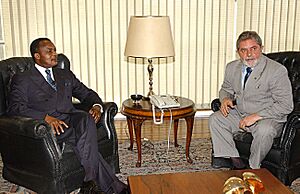
A new government was announced in November 1997. It mostly included members and relatives of groups supporting Sassou Nguesso. He also called for a national reconciliation meeting. However, Lissouba's followers rejected this idea. They continued fighting in the area between Pointe Noire and Brazzaville. In December 1997, heavy fighting started again in Brazzaville. Many people were killed, and thousands fled.
A meeting for unity and national reconciliation was held in January 1998. It decided on a three-year period of transition, followed by elections under a new Constitution. It also formed a National Transitional Council to act as a law-making body. However, the violence did not stop. By April 1998, groups against Sassou Nguesso were active throughout southern Congo. In early 1999, violence resumed in Brazzaville. Peace agreements were signed on 25 December, with help from President Omar Bongo of Gabon. This ended the civil war, which had caused many deaths and left the country damaged.
Presidential elections were held on 10 March 2002. Many candidates entered the race, but only seven remained. Some candidates withdrew, saying there was a lack of fairness in the election process. On 10 March, two days before the election, Andre Milongo, who was seen as the main challenger, also withdrew. He called for people not to vote.
The elections were peaceful. Sassou Nguesso won with 89.41% of the votes. The European Union Election Observation Mission reported some problems and manipulation in a few election offices. However, they said these problems did not change the final result. They asked for those responsible to be punished so it would not happen again.
Sassou Nguesso was chosen as Chairman of the African Union in January 2006. This happened as a compromise to prevent Omar al-Bashir from becoming chairman.
Re-election and Constitutional Changes (2009–2016)
Sassou Nguesso was re-elected as President of the PCT Central Committee in December 2006. He was re-elected in the July 2009 presidential election with 78.61% of the vote. This happened while many opposition groups boycotted the election. He said his re-election meant continued "peace, stability, and security." He also called for an end to "thinking like ... freeloaders" when talking about international aid. At his inauguration, Sassou Nguesso announced he would support a law to pardon Lissouba. Lissouba had gone into exile after being removed from power in 1997 and was judged while he was away. Sassou Nguesso wanted this pardon law to be presented to Parliament by the end of 2009.
As Congo-Brazzaville prepared to celebrate 50 years of independence from France in 2010, Sassou Nguesso said the country still had a long way to go to be truly independent. He stated, "Our country will not be totally independent until our people are free of the yoke of poverty."
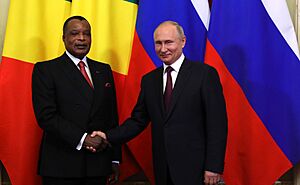
On 27 March 2015, Sassou Nguesso announced that his government would hold a public vote to change the 2002 constitution. This change would allow him to run for a third term in a row. The proposal was approved by a large majority of voters, with 92.96% in favor. The official turnout was 72.44%. However, the opposition argued that the results should be canceled because of low voter turnout.
On 20 March 2016, Sassou Nguesso ran for a third consecutive 5-year term. He was re-elected in the first round with 60% of the vote. Opposition leader Guy-Brice Parfait Kolelas came in second with 15% of the vote. Retired general Jean-Marie Mokoko, a former security adviser to Sassou Nguesso, was third with 14%.
For the first time in the country's history, these elections were watched over by an independent commission. The opposition rejected the results, claiming there was fraud. They called for people to peacefully resist the government.
Re-election (2021)
During the presidential election on 21 March 2021, Sassou Nguesso faced six other candidates. He came in first again, getting 88.4% of the votes. His main challenger, Guy Brice Parfait Kolélas, finished second with 7.96%. Mathias Dzon received 1.92%, and the other four candidates each received less than 1%.
In December 2022, he attended the United States–Africa Leaders Summit 2022 in Washington, D.C. There, he met with US President Joe Biden.
In July 2023, he attended the 2023 Russia–Africa Summit in Saint Petersburg. He met with Russian President Vladimir Putin. During the summit, Nguesso called for peace in Ukraine.
African Union and the Libyan Situation
Denis Sassou Nguesso is the Chairman of the African Union High Level Committee on Libya. He has stated that solving the Libyan crisis is "more than ever, an absolute urgency." This is especially important because of the possible negative impact of terrorist groups in southern Libya on nearby countries.
He has said that "this crisis remains, before any other consideration, an African problem."
Awards and Recognitions
National Awards
Foreign Awards
 Angola:
Angola:
 Benin:
Benin:
 Ivory Coast:
Ivory Coast:
 Portugal:
Portugal:
 Grand Collar of the Order of Prince Henry (1984)
Grand Collar of the Order of Prince Henry (1984)
 Russia:
Russia:
 Senegal:
Senegal:
 Togo:
Togo:
See also
 In Spanish: Denis Sassou-Nguesso para niños
In Spanish: Denis Sassou-Nguesso para niños
- List of presidents of the Republic of the Congo
- Robert Bourgi
- Lists of political office-holders in Congo
 | Isaac Myers |
 | D. Hamilton Jackson |
 | A. Philip Randolph |


